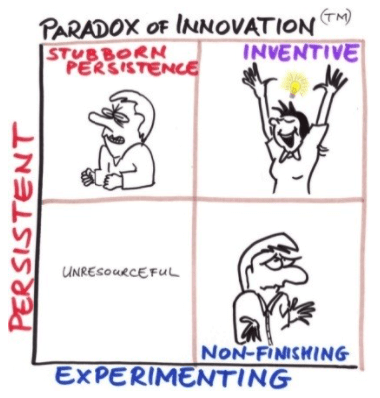
READ: Are you innovative enough to succeed?
 We are soon to hit the six-week cut-off where most people give up on the New Year resolutions, how are you doing with yours? Developing a new habit, implementing a new way of working or forging into a new market takes a lot of effort and persistence, as well as knowing when to experiment and change or adapt your approach.
We are soon to hit the six-week cut-off where most people give up on the New Year resolutions, how are you doing with yours? Developing a new habit, implementing a new way of working or forging into a new market takes a lot of effort and persistence, as well as knowing when to experiment and change or adapt your approach.
There is an interesting example of a man who at the age of 22 lost his job; the following year he decided to go into politics but was defeated in the election. Two years later he set up a business and, due to circumstances beyond his control, it failed and he ended up in debt. He cleared his debts and had another attempt at politics; this time he was elected – he was only 25. The following year his beloved sweetheart died and he was reported to have had a nervous breakdown, although this may have been a malicious fabrication. He was then defeated in his bid to become House Speaker and five years later he was defeated in his bid for Congress. He was eventually elected, but two years later he lost the re-nomination and was rejected for another senior position he wanted. Over the next 10 years he was defeated in his run for the Senate, his nomination for Vice President and another run for the Senate. However, at the age of 51 he became President of the United States of America and is widely recognised as one of the best presidents the country has ever had.
That man was Abraham Lincoln and it would be fair to say that he had persistence! It is also true to say that he was willing to adapt and change the way he did things in order to learn and ultimately to succeed: not only in becoming president but in changing one of the most pernicious, and at the time entrenched, economic models of the day – slavery.
A Fine Balance
There is a curious paradox with taking an innovative approach. It is quite a fine balance, and as the New Year gets going you may want to consider your own levels of persistence. For example, are you tenacious enough to see things through despite difficult obstacles? It is also worth exploring how willing you are to try new things and new ways of doing things, especially if what you are doing is not getting you the results you want.
The key thing about very successful people is that they have just made more mistakes than the rest of us. However, they don’t just make mistakes, they learn from them and keep going . . . relentlessly adapting and experimenting with what they do and how they do it.
The Paradox of Innovation
 It is useful to look at this paradox by using the graphic to the right. It neatly illustrates the way you need to have a balanced approach between the traits of ‘Persistence’ and ‘Experimenting’. The trait of being ‘Inventive’ could be summed up by this little maxim; “The key to invention is to have focused determination while letting the imagination run wild”. Inventive is defined as having the tendency to experiment with different ways of doing something while at the same time, maintaining focus on the desired objective or result (‘High Persistence’ and ‘High Experimenting’).
It is useful to look at this paradox by using the graphic to the right. It neatly illustrates the way you need to have a balanced approach between the traits of ‘Persistence’ and ‘Experimenting’. The trait of being ‘Inventive’ could be summed up by this little maxim; “The key to invention is to have focused determination while letting the imagination run wild”. Inventive is defined as having the tendency to experiment with different ways of doing something while at the same time, maintaining focus on the desired objective or result (‘High Persistence’ and ‘High Experimenting’).
If we are not careful we can end up with an imbalance that can lead to ‘Stubborn Persistence’; this is where our persistence outweighs our willingness or ability to experiment. This is the sort of behaviour that can generate resistance to change and narrow tunnel-vision. This century has already seen the rapid demise of numerous big-name companies because they had leadership teams who just stubbornly persisted with their old marketing and production strategies when the world around them was changing. They were blind to the need for a change in direction and ultimately lost their business. Sticking with what they knew was more comfortable than the mental effort of seeking a new approach. It is also worth noting that it takes courage to admit you were wrong and that new thinking is required. Stubborn persistence can also be exacerbated by feeling that the amount of effort and investment you put in will have been wasted if you change direction. Successful people take it all on the chin and move on.
The other imbalance that can manifest is when we experiment too much and don’t see things through. This is the trait of ‘Non-finishing’ and can come from an addiction to the new, novel and latest bright shiny idea, for example jumping on the latest technological or management fad. I have come across a number of entrepreneurs who attend a seminar or read the latest management book and then implement some grand idea, but within a couple of months they don’t see the results that were promised and they change to the next big thing. This frustrates operational managers because many initiatives take several months, if not years, to implement properly. They need to become a way of life, not a few cosmetic changes. Non-finishing can also afflict highly reactive managers who implement a new way of working as a knee-jerk reaction to a complaint or other error. This rapid experimentation with trying to fix a particular problem without properly analysing the root causes can lead to half-baked solutions that get dropped quite quickly. This also creates immense frustration amongst managers and staff, especially if they are not involved in the proposed solutions.
Some people fall into the trap of becoming ‘Unresourceful’ where they lack persistence and have no desire to try new things. This can happen when faced with a significant amount of volatility, uncertainty, complexity or ambiguity (VUCA). The best solution in this case is to get help from outside to introduce some new perspectives and encourage new levels of motivation.
We all enjoy different aspects of work and we all have different strengths that, when applied in the right context, help us to succeed. What do you enjoy most with regard to the Paradox of Innovation? Is it the persistence or the experimentation? Are you driven to see things through or are you full of bright ideas about how things could be improved or changed? Or do you have a good balance of both?
You may find it valuable to explore how you are getting on with your New Year resolutions and goals and regularly consider your approach. If you would like the answers to the questions above, or to explore precisely what you enjoy most at work, you can now complete a very simple questionnaire that provides numerous reports, including a snapshot of the innovative characteristics of your team. For more information about this and our unique approach to team development and recruitment just contact Gloria at info@talent4performance.co.uk.
Remember, especially as you consider innovation . . . stay curious!
David Klaasen
©David Klaasen – August 2016



